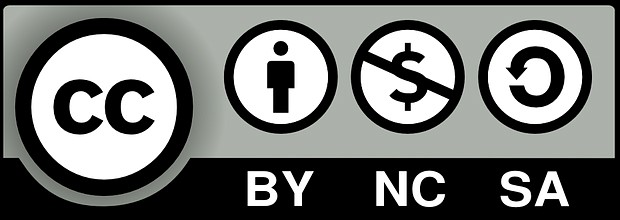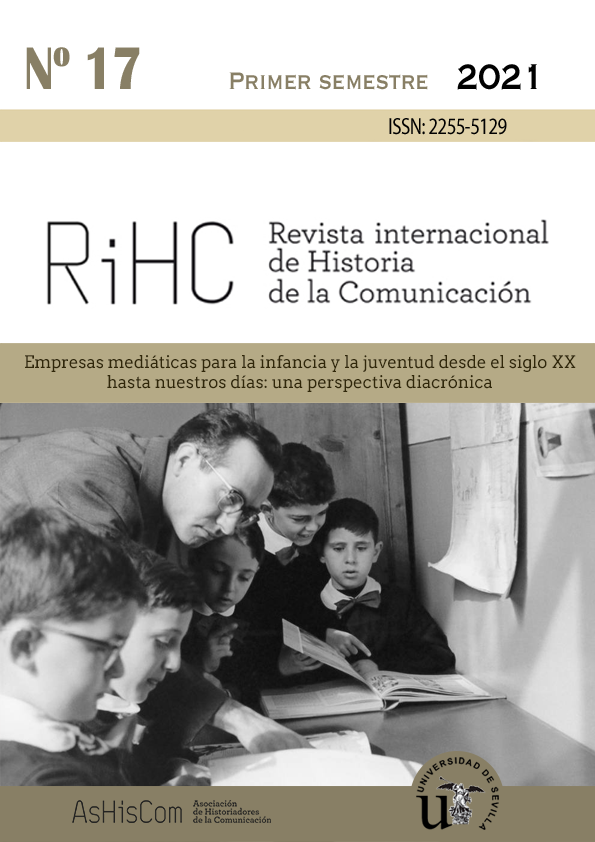La evolución de la producción original de la plataforma de pago HBO
DOI:
https://doi.org/10.12795/RiCH.2021.i17.12Palavras-chave:
Televisión por cable, producción televisiva, programa de televisión, entretenimiento, contenido de programaResumo
Cuando el servicio de televisión de pago HBO debutó en una noche tormentosa en el otoño de 1972, jamás se llegó a imaginar que su futuro iba a ser tan prometedor. En estas cuatro décadas, la cadena se ha convertido en una institución ofreciendo un servicio que ha cambiado la televisión, ha reconfigurado la industria del cine y ha avivado el entretenimiento en el hogar. Gracias a la evolución de su programación original, HBO ha creado un contenido audiovisual que subvierte la narrativa televisiva y los géneros más tradicionales dando paso a una nueva forma de contar historias donde la identificación con el espectador es mayor.
Downloads
Referências
AKASS, K. y MCCABE, J. (2005): Reading “Six Feet Under”: tv to die for, Londres, Reading Contemporary Television.
BARRIOS SOCÍAS, M. (1998): “La censura en la televisión por cable”. Revista Chilena de Derecho, nº4, octubre-diciembre de 1998, pp. 793-825. Recuperado de https://bit.ly/3dKllJY
BONAUT IRIARTE, J. (2016): “La muerte de la tercera edad dorada de la ficción televisiva: ¿y ahora qué?” en Nueva Revista, nº158, julio de 2016, pp. 140-152. Recuperado de https://bit.ly/3lZYezA
CABRERA, F. J., CAPPELLO, M., GRECE, C. y VALAIS, S. (2016): VOD, platforms and OTT: which promotion obligations for European works? European Audiovisual Observatory. Recuperado de https://bit.ly/3oFHe3u
CALVO, A. G. (11 de marzo de 2021): “Nueve razones por las que ‘The Wire’ es una obra maestra”. Sesnacine. Disponible en Internet: https://bit.ly/31P273a
CARTER, B. (1 de noviembre de 1992): “HBO as a Modern-Day Dickens”. New York Times. Disponible en Internet: https://nyti.ms/3zRftau
CASCAJOSA, C.C. (2006): No es televisión, es HBO: La búsqueda de la diferencia como indicador de calidad en los dramas del canal HBO. ZER, Revista de Estudios de Comunicación, nº21, noviembre de 2011, pp. 23-33. https://doi.org/10.1387/zer.3714
CELAYA, J. (2014): Nuevos modelos de negocio en la era digital, Madrid, Liber.
CBS News (26 de abril de 2002): “TV Guide Names Top 50 Shows”. CBS News. Disponible en Internet: https://cbsn.ws/3CYivMl
DEFINO, D.J. (2014): The HBO Effect, Estados Unidos, Bloomsburry.
DEL PINO, C. y AGUADO, E. (2012): “Internet, Televisión y Convergencia: nuevas pantallas y plataformas de contenido audiovisual en la era digital. El caso del mercado audiovisual online en España”. Observatorio (OBS) Journal, nº4, 2012, pp. 57-75. https://doi.org/10.15847/obsOBS642012590
DURÁN MANSO, V. (2016): “La representación del deseo en el cine de Tennessee Williams: homosexualidad masculina frente al Código Hays”. Femeris, nº1-2, julio de 2016, pp. 58-73. http://dx.doi.org/10.20318/femeris.2016.3227
EDGERTON, G.R. y JONES, J.P. (2008): Essential HBO Reader, Estados Unidos, The University Press of Kentucky.
El País (20 de mayo de 2019): “Así han respondido al final de ‘Juego de Tronos’ críticos de todo el mundo”. El País. Disponible en Internet: https://bit.ly/3oeBgab
GARCÍA MARTÍNEZ, A.N. (2010): “La despedida más amarga (‘In Treatment’)”. Diamantes en serie. Disponible en Internet: https://bit.ly/3zVL9eN
GUERRERO PÉREZ, E. (2011): “El ecosistema multiplataforma de los grupos televisivos españoles: los formatos de entretenimiento”. Revista Comunicación y Hombre, nº7, julio de 2011, pp. 85-103. Recuperado de https://bit.ly/3CSbigA
FERNÁNDEZ PENAS, M. y AGUADO PELÁEZ, D. (2013): “La hibridación como motriz de cambio en la las comedias de las series de televisión”. Archivos de la Filmoteca, nº72, enero de 2013, pp. 133-143. Recuperado de https://bit.ly/39JWzry
HUERTA, J.C. y DOMÍNGUEZ y SANZ, V. (2011): “Modelos over the top (OTT): regulación y competencia en los nuevos mercados de Internet”. Política Económica y Regulatoria en Telecomunicaciones, nº6, pp. 84-98.
HUERTAS PÉREZ, M. (2018): “Westworld a la estela de Juego de Tronos y de HBO”. Fòrum de recerca, nº13, 2018, pp. 115-128. http://dx.doi.org/10.6035/ForumRecerca.2018.23.8
IMDB (s.f.): “El show de Larry Sanders. Awards”. IMDb. Disponible en Internet: https://imdb.to/3rYJIfx
IMDB (s.f.): “Los Soprano. Awards”. IMDb. Disponible en Internet: https://imdb.to/3pVAcan
IZQUIERDO CASTILLO, J. (2012): “Distribución online de contenidos audiovisuales: análisis de los tres modelos de negocio”. El profesional de la información, nº4, julio de 2012, pp. 385-390. https://dx.doi.org/10.3145/epi.2012.jul.09
IZQUIERDO CASTILLO, J. (2015): “El nuevo negocio mediático liderado por Netflix: estudio del modelo y proyección en el mercado español”. El profesional de la información, nº6, noviembre de 2015, pp. 819-826. https://doi.org/10.3145/epi.2015.nov.14
LASIERRA, I. (2012): “Nuevos caminos en las estrategias narrativas de una serie dramática de televisión: The Wire (HBO, 2002-2008)”. Comunicación: revista Internacional de Comunicación Audiovisual, Publicidad y Estudios Culturales, nº10, mayo de 2012, pp. 136-150. Recuperado de https://bit.ly/39JuHE2
LAVERY, D., HOWARD, D. L. y LEVINSON, P. (2011): The essential Sopranos Reader, Estados Unidos, The University Press of Kentucky.
LEE, E. y KOBLIN, J. (8 de julio de 2018): “HBO Must Get Bigger and Broader, Says Its New Overseer”. The New York Times. Disponible en Internet: https://nyti.ms/2XX0GOt
LEVERRETE, M., OTT, B.L. y BUCKLEY, C.L. (2008): It’s Not T.V.: Watching HBO in the Post-Television Age, Nueva York, Routledge.
LINARES BARRONES, Á. (2021): El viaje fragmentado del héroe. Su representación en la ficción televisiva Game of Thrones, Madrid, Fragua Editorial.
LOZANO DELMAR, J., RAYA BRAVO, I. y LÓPEZ RODRÍGUEZ, F. J. (2013): Reyes, espadas, cuervos y dragones. Estudio del fenómeno televisivo Game of Thrones, Madrid, Fragua Editorial.
MESCE, B. (2015): Inside the Rise of HBO, Estados Unidos, McFarland & Company, Inc., Publishers.
MELLINS, M. (2012): “The Fantasia experience: True Blood fans, commodification and lifestyle”, en CHERRY, B. (eds.): True Blood: Investigating Vampires and Southern Gothic. Investigating Cult TV Series, Londres, Tauris, pp. 172-185.
MONZONCILLO, J. M. y SENDRÁ, J. (2010): “La televisión, entre la gratuidad y el pago”. Telos: Cuadernos de Comunicación e Innovación, nº85, diciembre de 2010, pp. 36-44. Recuperado de https://bit.ly/2Y4rn3x
OLIVEIRA JUNIOR, L. C. (2020): “Érase una vez en Westworld”. ARS (São Paulo), nº38, abril de 2020, pp. 107-137. https://doi.org/10.11606/issn.2178-0447.ars.2020.165541
ONANDIA GARATE, M. (2013): “Tres obras maestras de la ficción televisiva: The Sopranos, The Wire y Mad Men”. Revista del Departamento de Historia del Arte y Música de la Universidad del País Vasco, nº3, julio de 2013, pp. 133-150. Recuperado de https://bit.ly/39R8CDw
OJER, T. y CANAPÉ, E. (2012): “Nuevos modelos de negocio en la distribución de contenidos audiovisuales: el caso de Netflix”. Comunicación: revista Internacional de Comunicación Audiovisual, Publicidad y Estudios Culturales, nº10, mayo de 2012, pp. 191-192. Recuperado de https://bit.ly/3F7LbUL
ORGAZ, C. (18 de diciembre de 2019): “Cómo AT&T se convirtió en la empresa más endeudada del mundo (y qué tiene que ver HBO con ello)”. BBC News. Disponible en Internet: https://bbc.in/3kO6BhE
OSTERWALDER, A y PIGNEUR, Y. (2011): Generación de modelos de negocio, Barcelona, Deusto.
PALLOTTA, F. (3 de octubre de 2019): “‘Sesame Street’ is heading to HBO Max in 2020”. CNN. Disponible en Internet: https://cnn.it/3m8sBDg
PARSONS, P. (2003): “The evolution of the Cable-Satellite Distribution System”. Journal of Broadcasting & Electronic Media, nº47, 2003, pp. 1-17. Recuperado de https://bit.ly/3CNjNJM
PEPPER, S. (2019): What “Sesame Street” Can Teach Us About HBO, Estados Unidos, Northeastern Illinois University.
PÉREZ MIRANDA, P. (30 de noviembre de 2021): “Último día para suscribirse a HBO Max a mitad de precio para siempre”. El País. Disponible en Internet: https://bit.ly/3yaxfq8
POLAN, D. (2009): The Sopranos, Estados Unidos, Duke University Pres.
RUBIO HERNÁNDEZ, M. M. (2014): “Sexo en Nueva York”. FRAME, nº10, julio de 2014, pp. 111-115. Recuperado de https://bit.ly/2ZEh07r
SANTAELLA, F. (2016): “Series de HBO, piel del storytelling”. Estudios Venezolanos de Comunicación, Centro Gumilla, nº175, 2016, pp. 47-52. Recuperado de https://bit.ly/2WrujXN
SULLIVAN, J. (2010): Seven Dirty Words: The Life and Crimes of George Carlin. Estados Unidos, Da Capo Press Inc. Recuperado de https://bit.ly/2XWoh1r
ZARAZUA ABASCAL, D. (28 de septiembre de 2018): “HBO colgó los guantes después de 45 años de transmitir boxeo”. AS. Disponible en Internet: https://bit.ly/2WhnTu4
Downloads
Publicado
Como Citar
Edição
Secção
Licença
Direitos de Autor (c) 2021 RIHC. Revista Internacional de Historia de la Comunicación

Este trabalho encontra-se publicado com a Licença Internacional Creative Commons Atribuição-NãoComercial-CompartilhaIgual 4.0.
RiHC. Revista internacional de Historia de la Comunicación es una publicación de acceso libre, ofrece su contenido bajo el principio de que hacer disponible gratuitamente la investigación al publico apoya a un mayor intercambio de conocimiento global.
RIHC. Revista internacional de Historia de la Comunicación se adhiere a las diferentes iniciativas que promueven el acceso libre al conocimiento, por lo que todos los contenidos son de acceso libre y gratuito y se publican bajo licencia de Creative Commons Reconocimiento-NoComercial 4.0 Internacional.

En virtud de ello, los autores que publiquen en esta revista aceptan las siguientes condiciones:
Los autores conservan los derechos de autor y ceden a la revista el derecho de la primera publicación, con el trabajo registrado con la licencia de atribución de Creative Commons, que permite a terceros utilizar lo publicado siempre que mencionen la autoría del trabajo y a la primera publicación en esta revista.
Los autores pueden realizar otros acuerdos contractuales independientes y adicionales para la distribución no exclusiva de la versión del artículo publicado en esta revista (p. ej., incluirlo en un repositorio institucional o publicarlo en un libro) siempre que indiquen claramente que el trabajo se publicó por primera vez en esta revista.
Se permite y recomienda a los autores publicar su trabajo en Internet (por ejemplo en páginas institucionales o personales) ya que puede conducir a intercambios productivos y a una mayor y más rápida difusión del trabajo publicado (vea The Effect of Open Access).
No prevé moving wall o período de embargo
Debe utilizarse la versión de editor/PDF
La fuente editorial debe reconocerse



